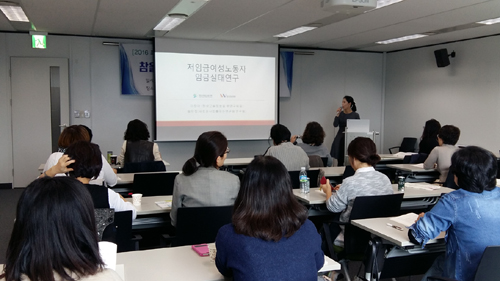
An argument was raised that five out of six women workers are belonging to the low wage group that is affected by the minimum wage.
The Korean Women Workers Association(KWWA) on October 27 raised such an argument on the basis of the outcome of a survey on 'the working conditions of low wage women workers'. The survey was carried out by the Korean Women Workers Association(KWWA) and eleven women workers associations across the country, interviewing with 933 women workers(726 offline and 207 online respondents) whose wages are close to the level of the national minimum wage.
The average (monthly) wage of respondents was 1,397,000 won(US$ 1,219) and median wage was 1,350,000 won(US$ 1,178). This level of wage is slightly higher than the national minimum wage of 1,260,270 won(US$ 1,100) fixed for the year 2016. This means that significant number of women workers are concentrated on the wage level under the influence of national minimum wage.
According to the '2015 survey result on the working conditions in accordance with the types of employment' released in April this year by the Ministry of Employment and Labor(MOEL), the proportion of women workers whose wages are not more than 1.5 times higher than the national minimum wage was 62.14%(male workers; 33.06%), and whose wages are not more than 2.5 times higher than the national minimum wage was 86.79%(male workers; 66.31%). The KWWA explains that five out of six women workers were under the influence of the national minimum wage.
This can be verified by the data of the Statistics Korea. According to the 'Economically Active Population Supplementary Survey in March 2016, workers who received less than the national minimum wage were 2,640,000 among whom 63.6% were women workers. The accumulated number of workers whose wages range from 90% to 110% of the national minimum wage was 1,850,000 among whom 64% were women workers.
Women workers with higher education were also found that they were trapped in the low wages around the level of minimum wage. More than half of respondents(online; 59.1%, offline; 68.6%) were the college/university graduates and 1/3 of them responded that they received their wages less than the national minimum wage. 54.7% of the offline respondents and 65.4% of the online respondents said that they had been paid less than the minimum wage before,
but most of them did not report the violation of the Minimum Wage Act to the authority. The reasons that they did not report the law violation to the authority were because others were also paid the same, or they were afraid of being fired, or they had difficulty in finding another job.
The vocational competency and skills developed through the careers of women workers were hardly recognized. Even though the average career length of respondents was 12 years and one month, the average period of continuous service reached only 4 years and 4 months. Wrong company practices such as 'no overtime pay' also seemed to have affected the women workers' low wage.
The average extra time for women workers to prepare and to finish for the assigned work was 32 minutes and 30 seconds, but seven out of ten were not paid for such an extra time work. Three out of ten respondents said that they were not paid for their overtime work.
Under such circumstances, most of respondents said that they experienced the shortage of living costs. Nine out of ten flatly responded that they can not make both ends meet with their wage income. To cope with the shortage of living costs, they were forced to spend less or to have loans from the banks.
An official of the KWWA said that a roadmap taking into account the living costs has to be designed to make possible the progressive raise of national minimum wage, and in case that an employer does not pay the legal minimum wage, the system should be strengthened to award the compensation for the punitive damages.
reported by Ku Eun-hoi
edited in English by Kim Sung-jin

